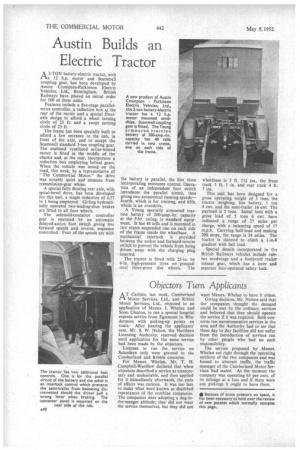Objectors Turn Applicants A T Carlisle , last week, Cumberland Motor Services,
Page 58

If you've noticed an error in this article please click here to report it so we can fix it.
Ltd., and Ribble Motor Services, Ltd., objected to an application of Messrs. J. Whelan and Sons, Cleaton, to run a special hospital express service from Egremont to Windermere with picking-up points en route.After hearing the applicants' case, Mr. S. W. Nelson, the Northern Licensing Authority, reserved decision until application for the same service had been made by the objectors.
Licenses to run the service on Saturdays only were granted to the Cumberland and Ribble concerns.
For Messrs. Whelan, Mr. T. H. Campbell-Wardlaw declared that when objectors described a service as unnecessary and undesirable, and then applied for it immediately afterwards, the state of affairs was curious. It was too late to make what were known as deathbed repentances of the combine companies. The companies were adopting a dog-inthe-manger attitude; they did not want the service themselves, but they did not want Messrs. Whelan to have it either.
Giving decision, Mr. Nelson said that the companies thought the demand could be met by the ordinary services and believed that they should operate the service if it was required. Both concerns ran unremunerative services in the area and the Authority had to see that these day to day facilities did not suffer from the introduction of services run by other people who had no such responsibility.
The service proposed by Messrs. Whelan cut right through the operating territory of the two companies and was bound to abstract traffic, the traffic manager of the Cumberland Motor Services had stated. At the moment the company was operating 63 per cent. of its mileage at a loss and if there were any pickings it ought to have them.




















































































